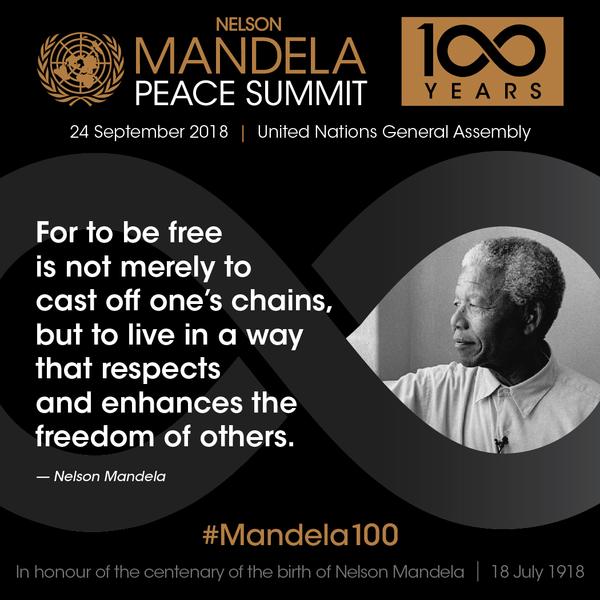Our common humanity demands that we make the impossible possible.

- World Leaders at Nelson Mandel Peace Summit
Nelson Mandela Decade of Peace
(2019 – 2028)
On 24 September 2018, world leaders gathered at United Nations Headquarters in New York for the Nelson Mandela Peace Summit. At the Summit, nearly 100 Heads of State and Government, Ministers, Member States and representatives of civil society participants adopted a political declaration committed to redoubling efforts to build a just, peaceful, prosperous, inclusive and fair world, as they paid tribute to the late South African President’s celebrated qualities and service to humanity.
Recognizing the period from 2019 to 2028 as the Nelson Mandela Decade of Peace, the Declaration saluted Mr. Mandela for his humility, forgiveness and compassion, acknowledging as well his contribution to the struggle for democracy and the promotion of a culture of peace throughout the world.
By the text, Heads of State and Government and Member States representatives reaffirmed their commitment to uphold the sovereign equality of all States and respect for their territorial integrity and political independence, as well as the duty of Member States to refrain from the threat or use of force. Recognizing that peace and security, development and human rights are the pillars of the United Nations system and the foundations for collective security and well‑being, the Declaration reaffirmed the 2030 Agenda for Sustainable Development.
“We resolve to move beyond words in the promotion of peaceful, just, inclusive and non‑discriminatory societies,” leaders pledged, as they stressed the importance of the equal participation and full involvement of women and youth.
They also declared that racism, xenophobia and related intolerance represent the very opposite of the purposes of the United Nations and emphasized their resolve to protect the rights of children, especially in armed conflict. “Protecting children contributes to breaking the cycle of violence and sows the seeds for future peace,” the Declaration said.
In addition, leaders reaffirmed that each State has a responsibility to protect its population from genocide, war crimes, ethnic cleansing and crimes against humanity. They underscored that civil society can play an important role in preventing conflicts, contributing to peacebuilding and advancing efforts to sustain peace.
Further by the Declaration, they emphasized the importance of a comprehensive approach to sustaining peace by preventing conflict and addressing its root causes and strengthening the rule of law, poverty eradication, and social development. “It is clear that lasting peace is not realized just by the absence of armed conflict, but is achieved through a continuing positive, dynamic, inclusive and participatory process of dialogue,” they underscored.
They also welcomed the example set by South Africa in unilaterally dismantling its nuclear‑weapon programme and recalled the firm plea made by Mr. Mandela in favour of the total elimination of nuclear weapons. They further recommended “in the spirit of Nelson Mandela’s legacy” that the United Nations explore means to consider the needs of present and future generations in its decision‑making processes.
Nelson Mandela Peace Summit
UN Headquarters, 24 September & 2 October —
In General Assembly resolution 72/243, adopted on 22 December 2017, UN Member States decided to convene a high-level plenary meeting, to be known as the Nelson Mandela Peace Summit, focusing on global peace, in honour of the centenary of the birth of Nelson Mandela.
More information:
- Summit details
- Political declaration adopted at the Nelson Mandela Peace Summit (A/RES/73/1)
- UN News — Countries pledge to be guided by Mandela’s legacy in working for a better world
- Press release — Nelson Mandela Peace Summit Unanimously Adopts Declaration, Resolving to ‘Move Beyond Words’, Redouble Efforts towards Peaceful, Prosperous, Fair World
Multimedia:


